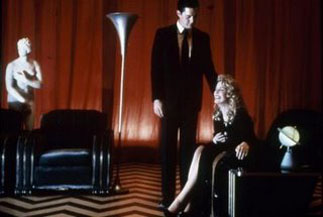|
|
Chapter Two:
|

|
The source of Lynch's power has always been the way his narratives unfold in the manner of dreams (not "dream-like") burbling through the frameworks of semi- recognizable story-lines that become fractured or detoured, fold in on themselves and erupt with moments that at their finest can not be explained but just experienced. Fire Walk With Me can't have a similar kind of mystery because the characters are already familiar to us and their story arcs are dictated by where they are at when the show starts. Lynch and Engels find ways to sidestep this: staging the first half-hour around the investigation into the murder of earlier victim Teresa Banks and offering elliptical and fleeting insights into Agent Cooper's ultimate fate at the climax of the series. Despite a few thankfully gonzo moments, Fire Walk With Me seems intent on remaining straightforward in its storytelling. The film feels less like a necessary project or something with Lynch's soul stamped into its frames and more of an attempt to wring the last dollars out of a bone-dry cash cow. I have too much respect for Lynch's integrity as an artist to believe this was intentional, but I also can't think of any other instance in his long, strange trip where it felt more like he was spinning his wheels. New at BOP: Share & Save
![]() Tweet
Tweet
![]() Print this column
Print this column
2) Fire Walk With Me may be the most humorless feature Lynch has produced to date. It could be argued that the subject matter - the last week in the life of a sexually abused, drug-addicted small-town girl as she spirals towards death at the hands of her father - doesn't lend itself towards jokiness but taste has never stopped Lynch from finding humor - deserved or not - in the darkest of circumstances: Dennis Hopper's foul-mouthed rallying cry of fornication in Blue Velvet; Robert Loggia's mobster pulling over a tailgater and nearly beating him to death in Lost Highway; Nicolas Cage smashing an assassin's head into pulp and juice on a marble staircase while coming on like Elvis in Wild at Heart.
|
Advertisement |
Twin Peaks the series often found its absurd humor in the balance of disparate elements such as grandiose reactions to death (Leland's hysterics and jubilant old-style dancing; Deputy Andy's grief-stricken breakdowns at crime scenes) with the poker-faced adoption of some of the more ridiculous plots of any number of prime-time soaps (characters believed to be dead aren't; a father almost commits unsuspecting incest with his daughter at a Canadian brothel). It was effectively spooky and disturbing when it needed to be without ever deliberately pushing the sex or violence quotient to extremes.
Twenty years later, the show seems tame in comparison to what has followed.
My recollection of the film is that it was a hard R, delving into the seamy aspects of the town that the show could only talk about. Perhaps my tolerance to sex and violence has become too formidable, but I have come to the conclusion that The Secret Diary of Laura Palmer, the book tie-in from 1991 written by Jennifer Lynch, is made of more volatile material than either the show or the movie and would have been an NC-17 if it had been filmed! Fire Walk With Me frequently feels like PG-13 or series material padded up to an R in a few choice spots. There are more moments of unsettling grotesquerie and a better evocation of the Black Lodge and The Red Room in the show than the movie. And there I go again, comparing the TV show with the movie, which leads me to the pair of key points as to why Fire Walk With Me underwhelms.

|
|
|

|
Friday, November 1, 2024
© 2024 Box Office Prophets, a division of One Of Us, Inc.

